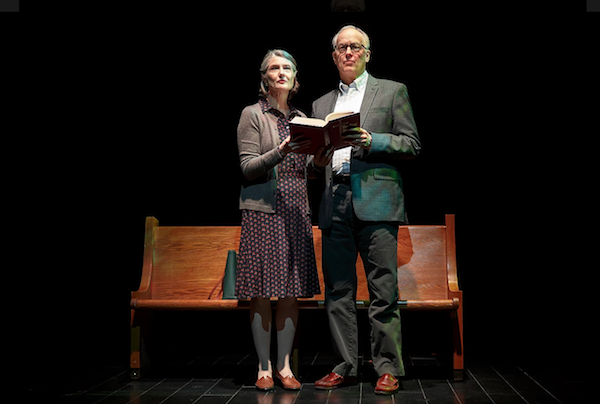
BY CHRISTOPHER BYRNE | In his brilliant and profoundly affecting and timely play “Man from Nebraska,” playwright Tracy Letts takes on one of the most classic literary forms: the quest. From “Gilgamesh” to Tolkein, the epic hero must persevere through seemingly insurmountable challenges on a “road of trials” to redeem themself and move on. Whereas most traditional epics exist in the realm of fantasy, Letts has written a very contemporary quest epic grounded in the real world.
Ken Carpenter lives a fairly ordinary life as an insurance executive in Lincoln, Nebraska. His life centers around family, work, and his Baptist faith. It is a comfortable, if largely unexamined, life. One night, Ken awakens to discover that he no longer believes in God. It is a devastating discovery that serves as the herald — speaking in the language of classic quest literature — that calls him to leave his home and embark on a journey. He heads for London, where he was stationed in the service 30 years earlier, in an attempt to discover who he is now. Again, in the language of literature, Ken must experience a metaphoric death and rebirth in order to complete his journey and return home.
Letts writes with wonderful economy that is consistently gripping. One is on edge throughout as Ken’s different encounters illuminate the changes occurring in him. The juxtaposition of the grand epic with unremarkable, quotidian sexual, artistic, and familial encounters gives the piece poig-nancy and makes Ken, like many quest heroes, an ordinary man who becomes willing to lose everything to achieve his ends. Not surprisingly, his family and his pastor are baffled by Ken’s journey and the question remains as to whether they can accept the transformed hero. Yet, they, too, perhaps less consciously, have been forced into their own quests by Ken’s actions.
As Ken, Reed Birney gives another fully realized and magnificently nuanced performance. The detail in every moment plumbs the deceptive simplicity of Letts’ writing. Birney is a fearless actor, who makes Ken’s conflict visceral for the audience. David Cromer’s equally brilliant direction finds truth and simplicity in every moment, and one never doubts for a moment that these are real people. The rest of the company is equally sublime. Notably, Annette O’Toole as Nancy, Ken’s wife, is extraordinary. Confused and frightened by her husband’s actions, she struggles to find equilibrium when her world is shaken. Nana Mensah as Tamyra, a bartender Ken opens up to in London, and Max Gordon Moore as Harry, an artist and Tamyra’s boyfriend who becomes a kind of guide for Ken, are both powerful yet deeply human. With the rest of the company, they create a rich world that envelops the audience in the story.
The set by Takeshi Kata is simple but effective as the scenes move fluidly between locations, and Keith Parham’s lighting is a dramatic force in and of itself.
Though this play is more spare than Letts’ other masterpiece, “August, Osage County,” it is no less expansive in terms of its exploration of human experience. Whether it’s the death of a patriarch, as in “August, Osage County,” or the death of the spirit, as in “Man from Nebraska,” Letts’ unerring skill in rendering classic themes in contemporary settings speaks to human experience that is as old, unsettling, and desperately in search of resolution as the human race itself. The explication of what the poet Gerard Manley Hopkins called “the fate that man was born for” resonates through Letts’ work and represents American literature at its finest.
MAN FROM NEBRASKA | 2econd Stage Theatre, 305 W. 43rd St. | Through Mar. 12: Tue.-Wed. at 7 p.m.; Thu.-Sat. at 8 p.m.; Wed., Sat. at 2 p.m.; Sun. at 3 p.m. | $37-$125 at 2st.com/tickets/buy-tickets or 212-246-4422 | Two hrs., 15 mins., with intermission






























